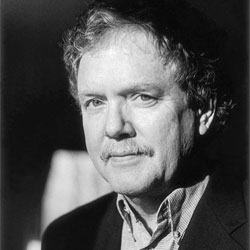Willie Cooper, what are you doing here, this early in your death?
To show us what we are, who live by twisting words—
Heaven is finished. A poet is anachronistic as a blacksmith.
You planted a long row and followed it. Signed your name X
for seventy years.
Poverty is not hell. Fingers cracked by frost
And lacerated by Johnson grass are not hell.
Hell is what others think we are.
You told me once, “Never worry.”
Your share of worry was as small as your share of the profits,
Mornings-after of lightning and radiator shine,
The beater Dodge you bought in late October—
By February, its engine would hang from a rafter like a ham.
You had a free place to stay, a wife
Who bore you fourteen children. Nine live still.
You live in the stripped skeleton of a shovelbill cat.
Up here in the unforgivable amnesia of libraries,
Where many poems lie dying of first-person omniscience,
The footnotes are doing their effete dance, as always.
But only one of your grandsons will sleep tonight in Kilby Prison.
The hackberry in the sand field will be there long objectifying.
Once I was embarrassed to have to read for you
A letter from Shields, your brother in Detroit,
A hick-grammared, epic lie of northern women and money.
All I want is to get one grain of the dust to remember.
I think it was your advice I followed across the oceans.
What can I do for you now?
Notes on the Poem
The work of poets weighs on Rodney Jones' mind - sometimes lightly, sometimes quite heavily - so it's not surprising to find a poem titled quite specifically about what concerns him. As he contemplates how to eulogize someone well, those self-deprecating worries bubble to the surface of this selection from Salvation Blues: One Hundred Poems, 1985-2005, shortlisted for the 2007 Griffin Poetry Prize. "To show us what we are" sounds like an admirable enough definition of the work of poets, but then ... "who live by twisting words" sounds kind of dodgy, and then he sums it up with "A poet is anachronistic as a blacksmith." When the poem's narrator observes about Willie Cooper that "Your share of worry was as small as your share of the profits" he's probably describing himself as much as Cooper, and with the same mixture of regret and relief. The same could be said of the note of yearning he strikes with "All I want is to get one grain of the dust to remember." Apart from the evidence interwoven throughout this poem, how did we draw the conclusion that the work of poets and the challenges of purveying poetry preoccupies Jones? That concern glows throughout this insightful and ultimately optimistic interview timed to the launch in 2006 of Salvation Blues.
